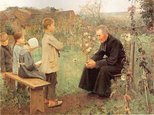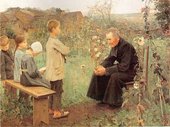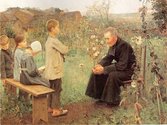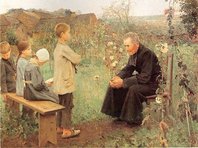 The Heidelberg Catechism: Lord's Day 52 127. Question: What is the sixth petition? Answer: And lead us not into temptation, but deliver us from the evil one. That is: In ourselves we are so weak that we cannot stand even for a moment.[1] Moreover, our sworn enemies-- the devil,[2] the world,[3] and our own flesh[4]-- do not cease to attack us. Wilt Thou, therefore, uphold and strengthen us by the power of Thy Holy Spirit, so that in this spiritual war[5] we may not go down to defeat, but always firmly resist our enemies, until we finally obtain the complete victory.[6] [1] Ps. 103:14-16; John 15:1-5. [2] II Cor. 11:14; Eph. 6:10-13; I Pet. 5:8. [3] John 15:18-21. [4] Rom. 7:23; Gal. 5:17. [5] Matt. 10:19, 20; 26:41; Mark 13:33; Rom. 5:3-5. [6] I Cor. 10:13; I Thess. 3:13; 5:23. 128. Question: How do you conclude your prayer? Answer: For Thine is the kingdom, and the power, and the glory, for ever. That is: All this we ask of Thee because, as our King, having power over all things, Thou art both willing and able to give us all that is good,[1] and because not we but Thy holy Name should so receive all glory for ever.[2] [1] Rom. 10:11-13; II Pet 2:9. [2] Ps. 115:1; Jer. 33:8, 9; John 14:13. 129. Question: What does the word Amen mean? Answer: Amen means: It is true and certain. For God has much more certainly heard my prayer than I feel in my heart that I desire this of Him.[1] [1] Is. 65:24; II Cor. 1:20; II Tim. 2:13.
0 Comments
 The Heidelberg Catechism: Lord's Day 50 125. Question: What is the fourth petition? Answer: Give us this day our daily bread. That is: Provide us with all our bodily needs[1] so that we may acknowledge that Thou art the only fountain of all good,[2] and that our care and labor, and also Thy gifts, cannot do us any good without Thy blessing.[3] Grant therefore that we may withdraw our trust from all creatures, and place it only in Thee.[4] [1] Ps. 104:27-30; 145:15, 16; Matt. 6:25-34. [2] Acts 14:17; 17:25; James 1:17. [3] Deut. 8:3; Ps. 37:16; 127:1, 2; I Cor. 15:58. [4] Ps. 55:22; 62; 146; Jer. 17:5-8; Heb. 13:5, 6.  The Heidelberg Catechism: Lord's Day 47 122. Question: What is the first petition? Answer: Hallowed be Thy Name. That is: Grant us first of all that we may rightly know Thee,[1] and sanctify, glorify, and praise Thee in all Thy works, in which shine forth Thy almighty power, wisdom, goodness, righteousness, mercy, and truth.[2] Grant us also that we may so direct our whole life– our thoughts, words, and actions– that Thy Name is not blasphemed because of us but always honored and praised.[3] [1] Jer. 9:23, 24; 31: 33, 34; Matt. 16:17; John 17:3. [2] Ex. 34:5-8; Ps. 145; Jer. 32:16-20; Luke 1:46-55, 68-75; Rom. 11: 33-36. [3] Ps. 115:1; Matt. 5:16.  The Heidelberg Catechism: Lord's Day 46 120. Question: Why has Christ commanded us to address God as Our Father? Answer: To awaken in us at the very beginning of our prayer that childlike reverence and trust toward God which should be basic to our prayer: God has become our Father through Christ and will much less deny us what we ask of Him in faith than our fathers would refuse us earthly things.[1] [1] Matt. 7:9-11; Luke 11:11-13. 121. Question: Why the words "in heaven"? Answer: These words teach us not to think of God's heavenly majesty as something earthly, [1] and to expect everything for body and soul from his almighty power.[2] [1] Jer. 23:23-24; Acts 17:24-25 [2] Matt. 6:25-34; Rom. 8:31-32  The Heidelberg Catechism: Lord's Day 20 53. Question: What do you believe concerning the Holy Spirit? Answer: First, He is, together with the Father and the Son, true and eternal God.[1] Second, He is also given to me,[2] to make me by true faith share in Christ and all His benefits,[3] to comfort me,[4] and to remain with me forever.[5] [1] Gen. 1:1, 2; Matt. 28:19; Acts 5:3, 4; I Cor. 3:16. [2] I Cor. 6:19; II Cor. 1:21, 22; Gal. 4:6; Eph. 1:13. [3] Gal. 3:14; I Pet. 1:2. [4] John 15:26; Acts 9:31. [5] John 14:16, 17; I Pet. 4:14.  The Heidelberg Catechism: Lord's Day 10 27. Question: What do you understand by the providence of God? Answer: God's providence is His almighty and ever present power,[1] whereby, as with His hand, He still upholds heaven and earth and all creatures,[2] and so governs them that leaf and blade, rain and drought, fruitful and barren years, food and drink, health and sickness, riches and poverty,[3] indeed, all things, come not by chance[4] but by His fatherly hand.[5] [1] Jer. 23:23, 24; Acts 17:24-28. [2] Heb. 1:3. [3] Jer. 5:24; Acts 14:15-17; John 9:3; Prov. 22:2. [4] Prov. 16:33. [5] Matt. 10:29. 28. Question: What does it benefit us to know that God has created all things and still upholds them by His providence? Answer: We can be patient in adversity,[1] thankful in prosperity,[2] and with a view to the future we can have a firm confidence in our faithful God and Father that no creature shall separate us from His love;[3] for all creatures are so completely in His hand that without His will they cannot so much as move.[4] [1] Job. 1:21, 22; Ps. 39:10; James 1:3. [2] Deut. 8:10; I Thess. 5:18. [3] Ps. 55:22; Rom. 5:3-5; 8:38, 39. [4] Job 1:12; 2:6; Prov. 21:1; Acts 17:24-28.  The Heidelberg Catechism: Lord's Day 9 26. Question: What do you believe when you say: I believe in God the Father almighty, Creator of heaven and earth? Answer: That the eternal Father of our Lord Jesus Christ, who out of nothing created heaven and earth and all that is in them,[1] and who still upholds and governs them by His eternal counsel and providence,[2] is, for the sake of Christ His Son, my God and my Father.[3] In Him I trust so completely as to have no doubt that He will provide me with all things necessary for body and soul,[4] and will also turn to my good whatever adversity He sends me in this life of sorrow.[5]He is able to do so as almighty God,[6] and willing also as a faithful Father.[7] [1] Gen. 1 and 2; Ex. 20:11; Job 38 and 39; Ps. 33:6; Is. 44:24; Acts 4:24; 14:15. [2] Ps. 104:27-30; Matt. 6:30; 10:29; Eph. 1:11. [3] John 1:12, 13; Rom. 8:15, 16; Gal. 4:4-7; Eph. 1:5. [4] Ps. 55:22; Matt. 6:25, 26; Luke 12:22-31. [5] Rom. 8:28. [6] Gen. 18:14; Rom. 8:31-39. [7] Matt. 6:32, 33; 7:9-11.  The Heidelberg Catechism: Lord's Day 8 24. Question: How are these articles divided? Answer: Into three parts: the first is about God the Father and our creation; the second about God the Son and our redemption; the third about God the Holy Spirit and our sanctification. 25. Question: Since there is only one God,[1] why do you speak of three persons, Father, Son, and Holy Spirit? Answer: Because God has so revealed Himself in His Word[2] that these three distinct persons are the one, true, eternal God. [1] Deut. 6:4; Is. 44:6; 45:5; I Cor. 8:4, 6. [2] Gen. 1:2, 3; Is. 61:1; 63:8-10; Matt. 3:16, 17; 28:18, 19; Luke 4:18; John 14:26; 15:26; II Cor. 13:14; Gal. 4:6; Tit. 3:5, 6.  The Heidelberg Catechism: Lord's Day 4 9. Question: Is God, then, not unjust by requiring in His law what man cannot do? Answer: No, for God so created man that he was able to do it.[1] But man, at the instigation of the devil,[2] in deliberate disobedience[3] robbed himself and all his descendants of these gifts.[4] [1] Gen. 1:31. [2] Gen. 3:13; John 8:44; I Tim. 2:13, 14. [3] Gen. 3:6. [4] Rom. 5:12, 18, 19. 10. Question: Will God allow such disobedience and apostasy to go unpunished? Answer: Certainly not. He is terribly displeased with our original sin as well as our actual sins. Therefore He will punish them by a just judgment both now and eternally,[1] as He has declared:[2] Cursed be every one who does not abide by all things written in the book of the law, and do them (Galatians 3:10). [1] Ex. 34:7; Ps. 5:4-6; 7:10; Nah. 1:2; Rom. 1:18; 5:12; Eph. 5:6; Heb. 9:27. [2] Deut. 27:26. 11. Question: But is God not also merciful? Answer: God is indeed merciful,[1] but He is also just.[2] His justice requires that sin committed against the most high majesty of God also be punished with the most severe, that is, with everlasting, punishment of body and soul.[3] [1] Ex. 20:6; 34:6, 7; Ps. 103:8, 9. [2] Ex. 20:5; 34:7; Deut. 7:9-11; Ps. 5:4-6; Heb. 10:30, 31. [3] Matt. 25:45,46.  The Heidelberg Catechism: Lord's Day 1 *Guilt * Grace * Gratitude 1. Question: What is your only comfort in life and death? Answer: That I am not my own,[1] but belong with body and soul, both in life and in death,[2] to my faithful Saviour Jesus Christ.[3] He has fully paid for all my sins with His precious blood, and has set me free from all the power of the devil.[5] He also preserves me in such a way[6] that without the will of my heavenly Father not a hair can fall from my head;[7] indeed, all things must work together for my salvation.[8] Therefore, by His Holy Spirit He also assures me of eternal life[9] and makes me heartily willing and ready from now on to live for Him.[10] [1] I Cor. 6:19, 20 [2] Rom. 14:7-9. [3] I Cor. 3:23; Tit. 2:14. [4] I Pet. 1:18, 19; I John 1:7; 2:2. [5] John 8:34-36; Heb. 2:14, 15; I John 3:8. [6] John 6:39, 40; 10:27-30; II Thess. 3:3; I Pet. 1:5. [7] Matt. 10:29-31; Luke 21:16-18. [8] Rom. 8:28. [9] Rom. 8:15, 16; II Cor. 1:21, 22; 5:5; Eph. 1:13, 14. [10] Rom. 8:14. 2. Question: What do you need to know in order to live and die in the joy of this comfort? Answer: First, how great my sins and misery are;[1] second, how I am delivered from all my sins and misery;[2] third, how I am to be thankful to God for such deliverance.[3] [1] Rom. 3:9, 10; I John 1:10. [2] John 17:3; Acts 4:12; 10:43. [3] Matt. 5:16; Rom. 6:13; Eph. 5:8-10; I Pet. 2:9, 10. Our Only Comfort. A Sermon by Adrian Dieleman |
The Heidelberg
|
 RSS Feed
RSS Feed
